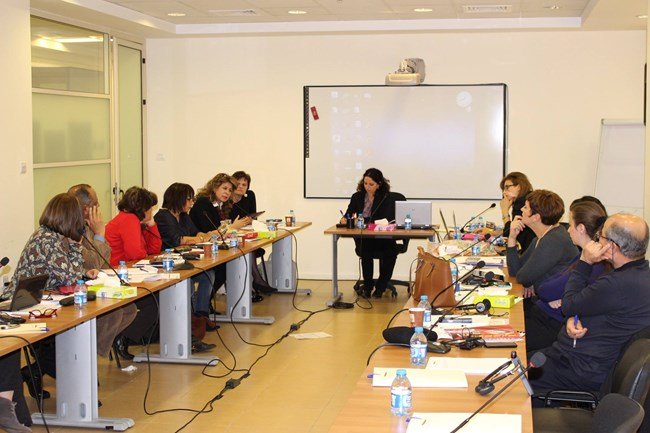Image:

18 Jan 2016
<strong>18 January 2016</strong><br />
<br />
More than 20 experts and representatives from seven Arab public broadcasters gathered at the Jordan Media Institute (JMI) for a peer-to-peer activity on gender equality in the Southern Mediterranean region.<br />
<br />
The two-day meeting, which opened on Wednesday, 13 January 2016, was part of JMI’s partnership with MedMedia, an EU-funded project for media reform and in cooperation with Permanent Conference of the Mediterranean Audiovisual Operators (COPEAM).<br />
<br />
JMI Dean, Basim Tweissi who addressed the opening said efforts to advance women’s issues and gender equality in the Arab world remain modest. He noted that while women are increasingly present on the screen, they are virtually absent in senior administrative and editorial positions in media organizations. He highlighted JMI’s gender policies that are not only applied to students and staff, but also in training opportunities.<br />
<br />
Representative of the European Union delegation to Jordan, Goncalo Guedes said equality between women and men was one of the EU’s founding principles. He noted the importance of the meeting in promoting a more positive and modern projection of women in media and communications, and designing employment policies that promote equal and fair treatment of men and women in media organizations.<br />
<br />
The participants from Jordan, Egypt, Palestine, Lebanon, Tunisia, Algeria and Morocco reported on the conditions of women in their public media organizations and efforts to adopt gender equality in their editorial policies and human resources, as well as monitoring media content and using gender-sensitive language. They also discussed establishing a data base for women experts in the region. <br />
<br />
Delegates then split up into groups to share views on ways to support women in their organizations. Lalia Behidj from Radio Algeria said, “We believe in a policy of small steps to gradually educate all staff in our group on the need to introduce a gender perspective in all human resources and programming strategies.”<br />
<br />
Zouhair Ben Hamad, from Tunisia’s National Radio commended such exchanges with other public broadcasters in the region because they make them aware that stereotypes based on gender and sexist thinking patterns are often very similar from one country to another<br />
<br />
Lana Saqqa from Palestine Radio and Television Corporation stressed the importance of the media in changing stereotypes of women and in undermining the patriarchal culture in Arab societies. While Shereen Awamleh from Jordan Radio and Television Corporation said she was working on ways to create an enabling environment for women and would seek to set up a gender unit at the corporation.<br />
<br />
JMI students joined in the discussions during the last session which sought to explore the views of young journalists on the issues raised during the two-day sessions.



